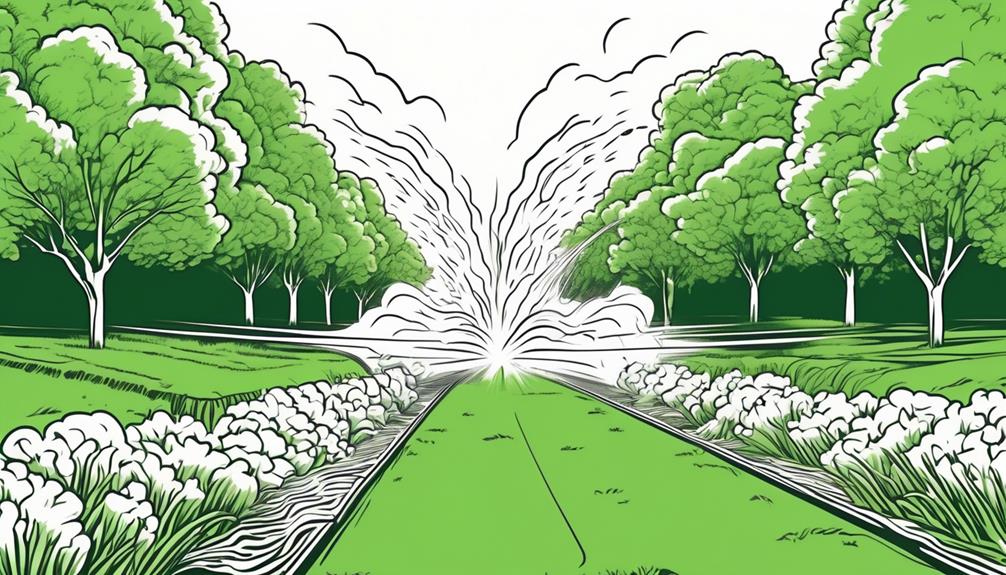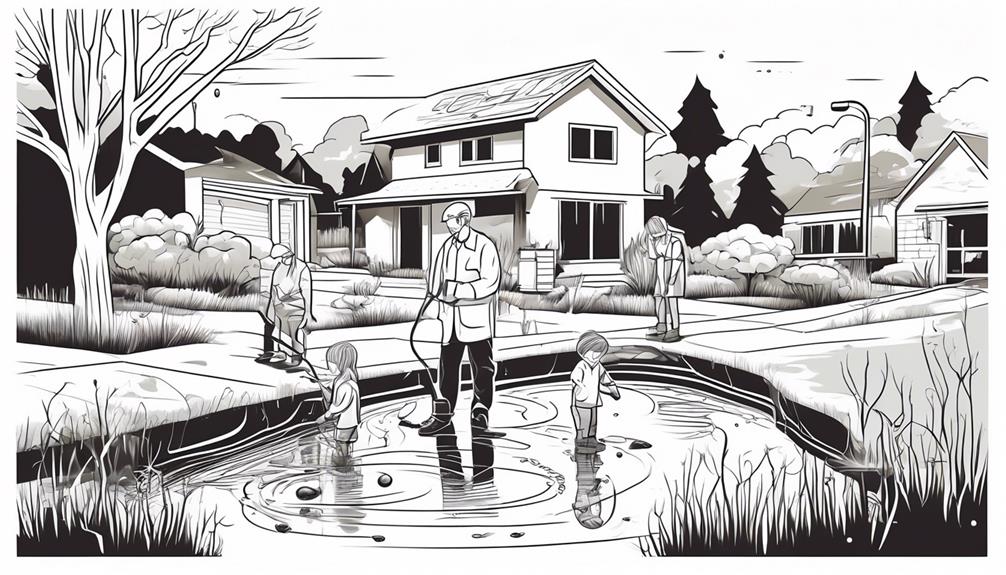As the drops from a leaking faucet slowly accumulate, so does the impact your household can have on water pollution. Ever wondered about the unseen ways your daily routines might be contributing to this issue?
Your household behaviors, from the products you use to the way you dispose of waste, play a crucial role in the health of our water sources. Let's explore how simple changes within your home can make a significant difference in protecting our waterways and the environment.
Key Takeaways
- Proper disposal of chemicals, cleaners, medications, and waste is crucial in preventing water pollution from household sources.
- Mindful usage of cleaning products, pesticides, and herbicides can significantly reduce contamination of water sources.
- Implementing eco-friendly yard and pet waste management practices can help in preserving water quality.
- Regular maintenance of septic systems and proper management of rainwater runoff are essential for preventing groundwater and surface water pollution.
Common Household Pollutants
When it comes to common household pollutants, your actions play a significant role in preventing water pollution. Household water can easily become contaminated if chemicals, cleaners, and medications aren't disposed of properly. It's crucial to take these items to approved locations for safe disposal to prevent water contamination.
Additionally, using minimal amounts of bleach, phosphate-free detergents, and pesticides can greatly reduce chemical pollution in water sources.
Proper maintenance of septic systems and preventing litter from entering waterways are also essential steps in safeguarding water quality. Indiana American Water is proactive in investing in wastewater treatment and infrastructure to help prevent water pollution.
Participating in household hazardous waste recycling events and using correct disposal methods are simple yet effective ways for households to contribute to preventing water contamination. By being mindful of the products you use and how you dispose of them, you can make a significant impact on keeping our water clean and safe for all.
Impact of Cleaning Products
To minimize water pollution from cleaning products, it is essential to use them sparingly and choose environmentally friendly options like phosphate-free detergents. When washing dishes or clothes, use minimum amounts of bleach or detergent to reduce the impact on water quality. Additionally, applying pesticides, insect sprays, fertilizers, and herbicides sparingly can help prevent water contamination. It is crucial to avoid pouring toxic chemicals or automotive fluids into storm drains as they can severely impact water quality. Dispose of chemicals at designated facilities or events to prevent water pollution and safeguard the environment.
| Tips to Minimize Water Pollution from Cleaning Products |
|---|
| Use cleaning products sparingly |
| Choose phosphate-free detergents |
| Apply pesticides and herbicides minimally |
| Properly dispose of chemicals to remove contaminants |
Proper Medication Disposal
When it comes to proper medication disposal, remember to use approved locations to prevent water pollution.
Participate in household hazardous waste recycling events for safe medication disposal.
Avoid flushing medications down drains or toilets to protect water quality.
Safe Medication Disposal
Properly disposing of medications involves taking unused or expired drugs to designated disposal locations to prevent water contamination. Flushing medications down the toilet can lead to poor water quality and harm aquatic life. When pharmaceuticals enter wastewater treatment plants, they can be difficult to remove and end up in our water supply, affecting safe drinking water.
Participating in household hazardous waste recycling events ensures medications are disposed of responsibly, safeguarding water quality. Dumping medications down drains is a significant contributor to water pollution, making it crucial to follow proper disposal methods. By taking these simple steps, you can play a vital role in protecting our water sources from contamination and ensuring safe drinking water for all.
Environmental Impact Concerns
By ensuring your medications are disposed of properly at approved locations, you actively contribute to reducing water pollution and safeguarding our environment. Improper disposal of medications can lead to the prevalence of contamination in the water supply, resulting in contaminated water that affects not only aquatic life but also our drinking water. Participate in household hazardous waste recycling events to safely dispose of chemicals, and avoid dumping them down drains to protect water quality. Remember to dispose of medications in their original packaging at designated sites to prevent water contamination. Your efforts in using proper disposal methods play a crucial role in maintaining the health of our water sources and the environment.
| Environmental Impact Concerns | |
|---|---|
| Prevalence of Contamination | Proper Medication Disposal |
| Water Supply | Household Hazardous Waste Recycling Events |
| Contaminated Water | Avoiding Dumping Chemicals Down Drains |
| Proper Disposal Methods | Medications in Original Packaging at Designated Sites |
Community Education Initiatives
Community education initiatives promote the responsible disposal of medications to protect water quality from pollution. When it comes to proper medication disposal, consider the following:
- Utilize Approved Locations: Dispose of medications at designated drop-off sites to prevent them from entering surface water sources.
- Prevent Water Contamination: Safeguard water quality by participating in community education initiatives focused on medication disposal.
- Impact on Water Samples: Improper disposal can lead to pharmaceuticals contaminating water samples, affecting aquatic life.
- Household Contribution: By adhering to these initiatives, households play a vital role in preventing water pollution from pharmaceutical waste.
Yard Maintenance Practices

Enhance your yard's sustainability by adopting eco-friendly yard maintenance practices to prevent water pollution. Avoid overusing pesticides and herbicides that can seep into water sources.
Regularly check and maintain your irrigation system to prevent water wastage and runoff. Opt for environmentally friendly fertilizers and organic mulch to keep your soil healthy and prevent chemical runoff into water bodies.
Dispose of yard waste properly to avoid clogging storm drains and contaminating water. Consider incorporating rain gardens or permeable paving in your yard to reduce stormwater runoff and encourage natural water filtration.
By following these practices, you can play a significant role in safeguarding water quality in your community. Additionally, for households without access to municipal water storage facilities, such as washing dishes outdoors, it's crucial to be mindful of the impact of cleaning products on the environment.
Prioritize sustainable yard maintenance to protect water sources and promote a healthier ecosystem for all.
Pet Waste Management
To further protect water quality in your community, proper pet waste management is essential to prevent contamination. Here are some tips for effective pet waste management in households:
- Always dispose of pet waste properly to prevent contamination of water sources.
- Use biodegradable pet waste bags for disposal to reduce environmental impact.
- Avoid allowing pet waste to wash into storm drains, as it can flow directly into water bodies.
- Consider composting pet waste in a designated area away from water sources and your septic system.
Household Pesticides and Herbicides

When using pesticides and herbicides at home, it's crucial to be mindful of their impact on the environment and your health.
Excessive use of these chemicals can lead to water contamination and harm aquatic life. Remember to follow guidelines on proper application and disposal to help protect water quality for everyone.
Impact of Pesticides
Household pesticides and herbicides play a significant role in water pollution by contaminating water sources through runoff and leaching. When these chemicals are used in excess or not correctly applied, they can lead to contamination of water systems, posing risks to aquatic life and ecosystems.
The impact of pesticides on water quality can also extend to human health, especially when herbicides find their way into drinking water sources. To prevent potential contamination, it's crucial to store and dispose of household pesticides and herbicides properly.
Environmental protection starts at home, and by being mindful of how we use these products, we can contribute to safeguarding our water resources for future generations.
Herbicides and Health
Contaminating water sources through runoff and leaching, household pesticides and herbicides can have a direct impact on both aquatic ecosystems and human health. Using excessive herbicides can lower water quality, leading to potential water shortages. Additionally, these chemicals can seep into well water, posing health risks to those who consume it.
To mitigate these effects, it's crucial to dispose of household chemicals properly and use herbicides sparingly. Regular maintenance of septic systems and refraining from unnecessary chemical use are essential steps to safeguard water quality. Participating in household hazardous waste recycling events and following approved disposal methods can also help prevent water pollution from household pesticides and herbicides.
Septic System Maintenance
To maintain a healthy septic system, regular pumping and inspection are essential to prevent issues and ensure proper functionality. Neglecting septic system maintenance can lead to contamination of groundwater, posing risks to both the environment and public health.
Here are some crucial tips to help you maintain your septic system effectively:
- Regular Pumping: Schedule routine pumping every 3-5 years to remove accumulated solids and prevent blockages.
- Avoid Flushing Non-Biodegradable Items: Refrain from flushing items like feminine products, diapers, or paper towels that can clog the system.
- Use Water Efficiently: Be mindful of water usage to prevent overloading the septic system and potential leaks or backups.
- Mindful Chemical Usage: Watch out for harsh chemicals that can disrupt the necessary balance of bacteria in the septic tank.
Rainwater Runoff Management

Proper management of rainwater runoff is crucial for preventing water pollution and preserving water quality. When rain falls, it can pick up various pollutants like chemicals, oils, and debris as it flows over surfaces. Without adequate management, this polluted runoff can find its way into water bodies, harming ecosystems and human health. In areas without proper rainwater runoff systems, high levels of contaminants can seep into piped water sources, leading to water quality issues.
To address this, techniques such as rain gardens, permeable pavements, green roofs, and rain barrels can be implemented. These methods help collect, store, and treat rainwater, preventing it from carrying harmful substances into waterways. By effectively managing rainwater runoff, you can play a part in reducing water pollution, preserving water quality, and even mitigating flooding in urban areas. Sustainable practices in rainwater management not only benefit the environment but also contribute to water conservation efforts, lessening the strain on public water supplies.
Frequently Asked Questions
How Do Homes Contribute to Water Pollution?
You contribute to water pollution through improper chemical disposal, overuse of pesticides, and neglecting septic systems. Indiana American Water aims to reduce pollution. Protect water quality with proper habits like responsible waste disposal and eco-friendly practices.
How Do Households Pollute Water?
When you pour fats, oils, or chemicals down drains, flush medications or unnecessary items, or improperly dispose of solids, your household contributes to water pollution. Follow proper disposal methods to protect our waterways.
What Are Some Household Causes of Water Pollution?
When it comes to water pollution, your household can unknowingly contribute. Simple actions like proper chemical disposal, using eco-friendly cleaners, and maintaining your septic system play a vital role in keeping our water clean.
What Role Do Humans Play in Water Pollution?
You contribute to water pollution through improper disposal of household chemicals, overuse of garbage disposals, excessive bleach or detergent, and neglect of septic systems. Taking small steps like proper disposal and minimal chemical usage can make a big difference.
Conclusion
So, next time you clean, remember to use environmentally friendly products, dispose of medications properly, pick up after your pets, maintain your yard responsibly, and take care of your septic system.
By making small changes in your household habits, you can make a big impact on water pollution.
Let's all do our part to protect our water sources and keep them clean for future generations.
Let's clean up our act and clean up our water!
